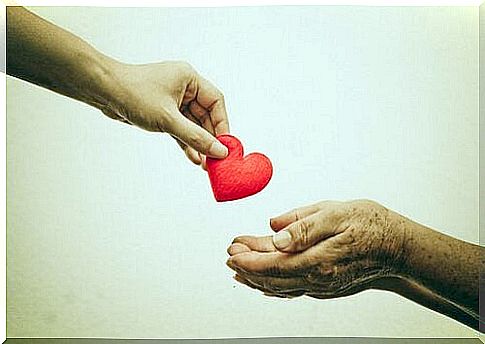Compassion Opens The Heart And Makes Us Happier

Compassion is the ability we have to understand the suffering of another and corresponds to the desire to alleviate and reduce that suffering. The concept of compassion is simpler and at the same time more intense than empathy. This feeling encourages us to want to help and mitigate the suffering of others.
Self-pity, on the other hand, leads us to an understanding attitude toward ourselves, especially when things don’t go our way. Learning to develop compassion can help us feel more happiness and satisfaction in our daily lives; without abusing or needing to recreate one’s life, naturally.
Psychologist and researcher Paul Gilbert, creator of compassion-centered therapy, points out that feeling compassion doesn’t mean feeling sorry for other people. It is more of a motivation that gives us energy to help other people, so that they themselves can alleviate their own suffering with our help.
The components of compassion
The word compassion literally means “suffering together” or “dealing with emotions from sympathy”. It is an emotion that appears when we perceive the suffering of other people and that provokes an impulse in us to reduce this suffering. The emotion of compassion is divided into different components:
- A cognitive component that encompasses attention to and assessment of the suffering of others. In addition to recognizing our abilities to act in the face of other people’s suffering.
- A behavioral component l that includes the commitment on the part of each one and the firm decision to take actions that help to eliminate the suffering.
- An emotional component that drives us to act from the inside, generating emotional reactions that provide us with personal satisfaction. Our degree of psychological well-being depends in part on the type of relationships we forge with other people. If we weave relationships with strands of kindness and compassion, it is easier for us to feel satisfied with our actions.

Compassion opens the heart
This emotion facilitates the connection with our heart so that we can put ourselves in other people’s shoes. It opens the door to our emotions, allowing us to feel how other people are experiencing what causes pain or suffering.
Compassion, when true, helps us to stop looking at our navel and start looking up to see what’s going on around us. It reminds us that we are not alone in this world, that other people matter too. Furthermore, if the help we offer is honest, it will bring us tremendous inner peace.
The act of compassion brings us closer to the other, offers us the possibility of giving our best to help other people, with humility and affection. This makes us more human, sensitive and honest with the people around us and, of course, with ourselves. Every time we worry about someone in need, we are pleasing the heart and offering the other sincere help.
the fear of compassion
Why don’t we seize opportunities when we have so many? We do not give ourselves the opportunity to act compassionately because our focus is not in the right place. Social neuroscience has shown that our natural impulse is to help. We are prepared to offer help at the brain level. So why don’t we sometimes help?
The emotion of compassion can make us feel afraid to act for different reasons, for example:
- Thinking that helping other people alleviate their suffering puts us in a vulnerable situation, and that can lead to rejection.
- Being unable to watch other people suffer because it can trigger emotions of sadness that we might not want to feel.
- Relive, through the feeling of compassion, unresolved childhood wounds that prevent us from establishing a connection with the suffering of others.
- Feeling that if we connect with the suffering of others, we won’t be able to get out of it later.
- Focus our attention on other things that we think are “more important”.
Self-compassion, the ability to accept ourselves the way we are
Self-compassion is built when we realize our internal suffering, managing to understand its meaning, in addition to allowing us to accept it and provide us with affection. It’s a way to foster a loving attitude toward ourselves when things don’t go our way.

Compassion invites us to look at society as a force for transformation, from the inside towards the outside. Rather than being filled with self-criticism and judgment, self-compassion allows us to be benevolent and to develop a loving adult within us who cares and protects himself every day. Suffering, instead of pulling us away from humanity, unites us with it.
4 steps to developing compassion
If we want to perceive the suffering of others and exercise self-compassion, it will be necessary to train the way to perceive suffering. The only thing we need is to understand, or better, to realize that we are not alone, that there are people who need help. That is, look to the side. This implies that, when coming into contact with the suffering of others, we can feel overwhelmed by our emotions. This will be our second task, learning to manage the emotions that arise in us when we act out of compassion.
realize the suffering
Realizing your own and others’ suffering is the first step in feeling compassion. For this we will need to open our hearts so we can get in touch with our emotions. For example, if we’re walking down the street and we see someone suffering, we can stop for a moment so that we can see that suffering, rather than moving on as if it wasn’t about us.
Assess the suffering of others
It is important to practice looking without judgment because otherwise compassion will not arise within us. It won’t show up either if we haven’t taken the previous step of noticing suffering. For example, if we think that the person deserves the suffering, then it’s possible that compassion doesn’t show up.
Fully feel the emotion
Opening up to emotions means allowing us to feel all the emotions, even if they sometimes produce suffering and a little discomfort. If we let ourselves be carried away by compassion, we will be able to connect with a feeling of kindness.
For example, when we see news on television that impacts us, we should allow ourselves to cry, not block the feeling that arises. That way we will be able to feel freer when we feel compassion.
take action
Once we are able to perceive the suffering of others, assess how great it is and feel it uncensored, we need to act so that the feeling is not kept. For example, getting to work to try to alleviate the suffering of our friend or relative and provide the emotional support that the person so desperately needs.
The Positive Effects of Compassion
There are many positive effects for society and for ourselves when we can feel the feeling of compassion. For the Dalai Lama, the power of compassion has the ability to:
- Foster a type of education aimed at empathy, ethics and personal development.
- Create new economic systems that are fairer for society.
- Recognize that we are a single human species, in which there is no separation between them/us or superior/inferior.
- Develop dialogue and communication instead of violence.
- Reduce social inequality, allowing for more transparency in all areas of life.
- End cultural differences, as well as prejudice and corruption.

If we include compassion in our lives, we will notice significant changes. We can try to imagine a loved one suffering and see what effects it has on our bodies. Send that dear person feelings of kindness and compassion. See what this exercise changes in ourselves. Then try to send good feelings to someone you don’t like and see what’s going on in your body.
Mindfulness or mindfulness helps us to develop this compassion that we can then transfer to others. In order to develop compassion, we will have to create a mental space, as if it were our private consultation, in which we need to perceive the suffering of others in order to take action. Thus, we will start by placing our little grain of sand, helping to build a fairer and more generous world.
Changing society starts with treating ourselves better, practicing empathy and compassion with each one of us and then with everyone. There are no excuses for not getting started today. The sooner we start to experience compassion, the more happiness and well-being we will be able to feel in our daily lives.









